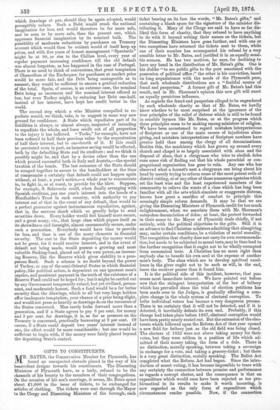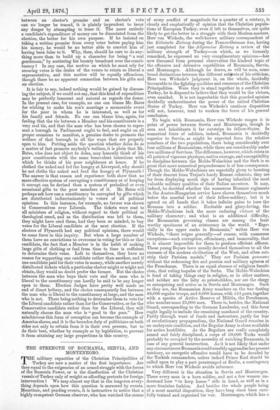GIFTS TO CONSTITUENTS. r . BATES, the Conservative Member for Plymouth,
has found an unexpected obstacle placed in the way of his benevolent designs towards his constituents. The Dissenting Ministers of Plymouth have, as a body, refused to be the channels of his bounty to the members of their congregations. On the occasion of his son's marriage, it seems, Mr. Bates spent about £1,000 in the issue of tickets, to be exchanged for articles of clothing. The tickets were sent through the Mayor to the Clergy and Dissenting Ministers of the borough, each ticket bearing on its face the words, "Mi. Bates's gifts," and containing a blank space for the signature of the minister dis- tributing it. Many of the Clergy are said to have so far dis- liked this form of charity, that they refused to have anything to do with it beyond writing their names on the tickets, but the Dissenting Ministers have gone further, and with one or two exceptions have returned the tickets sent to them, while one of their number has accompanied his refusal by a very sensible letter to Mr. Bates, and justified it in an equally sensi- ble sermon. He has two motives, he says, for declining to have any hand in the distribution of Mr. Bates's gifts. One is his dislike "to see public gifts to the poor associated with the possession of political office ;" the other is his conviction, based on long acquaintance with the needs of the Plymouth poor, that such wholesale distributions are a "fruitful. source of fraud and pauperism." A former gift of Mr. Bates's had this result, and in Mr. Sharman's opinion this new gift will exert an equally pernicious influence.
As regards the fraud and pauperism alleged to be engendered by such wholesale charity as that of Mr. Bates, we hardly know whether to be most surprised at the ignorance of the true principles of the relief of distress which is still to be found in sensible laymen like Mr. Bates, or at the progress which these principles seem to be making among ministers of religion. We have been accustomed to regard mistaken interpretations of Scripture as one of the main causes of injudicious alms- giving, and mistaken interpretations of Scripture nowhere have greater hold than among the clergy of all denominations. Besides this, the machinery which has grown up around every church and chapel is so largely associated with alms and the disposal of alms, that a clergyman who tries to abolish doles runs some risk of finding out that his whole parochial or con- gregational organisation has gone to ruin. Any one who has observed what a hornet's nest a clergyman can bring about his head by merely trying to reform some of the most patent evils of district visiting, or of any other of those numerous agencies which set the least wise and the least experienced members of the community to relieve the wants of a class which has long been familiar with all the arts which simulate or exaggerate distress, knows how great a sacrifice of comfort to principle this seemingly simple reform demands. It may be that we are giving the Dissenting Ministers of Plymouth credit for too much enlightenment, when we associate them with Mr. Sharman's outspoken denunciation of doles; at least, the protest forwarded in their name to the Mayor of Plymouth deals chiefly, if not entirely, with the political objections to the gifts. Still it is an advance to find Christian ministers admitting that almsgiving may, under certain conditions, be a violation of social morality. The recognition that charity.does not carry its own recommenda- tion, but needs to be subjected to moral tests, may in time lead to the further recognition that it ought not to be wholly exempted from economical tests. A Christian has no more light than anybody else to benefit his own soul at the expense of another man's body. The alms which are to develop spiritual excel- lence in the giver ought not to be such as will, in the end, leave the receiver poorer than it found him.
It is the political side of this incident, however, that pos- sesses most immediate interest. We have pointed out before now that the stringent interpretation of the law of bribery which has prevailed since the trial of election petitions has been made over to the Judges, is gradually effecting a com- plete change in the whole system of electoral corruption. To bribe individual voters has become a very dangerous process. There is no certainty that it will not be detected, and if it is detected, it inevitably defeats its own end. Probably, if this change had taken place before 1867, electoral corruption would have been pretty nearly rooted out. But the extension of the elec- torate which followed upon the Reform Act of that year opened a new field for bribery just as the old field was being closed. The electors of 1832 were not above taking money for their votes, but they were seldom in a position of life which ad- mitted of their money taking the form of a dole. There is no distinction, morally speaking, between taking a sovereign in exchange for a vote, and taking a grocery-ticket ; but there is a very great distinction, socially speaking. The Ballot Act completed what the Reform Act had begun. Since the intro- duction of secret voting, it has become impossible to trace with any certainty the connection between promise and performance as regards a corrupt elector, and the consequence is that an expenditure which would once have been rejected as too pro- blematical in its results to make it worth incurring, is now regarded as the only form of expenditure which circumstances render possible. Now, if the connection between an elector's promise and an elector's vote can no longer be traced, it is plainly imprudent to incur any danger by attempting to trace it. The more entirely a candidate's expenditure of money can be dissociated from the election, the better for his own purpose. If he insisted on taking a written promise from every voter before paying him his money, he would be no better able to convict him of having been false to it. Why, then, should he care to do any- thing more than to build up a character for being "a real gentleman," by scattering his bounty broadcast over the consti- tuency I In any case, the motive on which he must rely for securing votes is the desire of the voters to retain so liberal a representative, and this motive will be equally efficacious, though there be no apparent connection between his gifts and an election.
It is fair to say, indeed nothing would be gained by -discuss- ing the subject, if we could not say, that this kind of expenditure may be perfectly innocent and natural as regards the donor. In the present case, for example, no one can blame Mr. Bates for wishing to make his son's marriage a memorable event for the poor in whom he is interested, as well as for his family and friends. No one can blame him, again, for feeling that the tie between a Member and his constituents is a very real tie, and that the man who has been chosen to repre- sent a borough in Parliament ought to feel, and ought on all proper occasions to manifest, a genuine desire to promote the welfare of that borough in all the ways that are properly open to him. Putting aside the question whether doles do as a matter of fact promote anybody's welfare, it is plain that Mr. Bates, who does not object to doles, may honestly think of his poor constituents with the same benevolent intentions with which he thinks of his poor neighbours at home. If he clothed the naked and fed the hungry at Liverpool, why should he not clothe the naked and feed the hungry at Plymouth ? The answer is that reason and experience both show that no more effective system of corrupting a constituency or of keeping it corrupt can be devised than a system of periodical or even occasional gifts to the poor members of it. Mr. Bates will perhaps ask how can a constituency be corrupted by gifts which are distributed indiscriminately to voters of all political opinions. In this instance, for example, no favour was shown to Conservatives over Liberals. The tickets were sent to all ministers of religion, without regard to their political or theological creed, and as the distribution was left to them, they might have used them, had they been so minded, to buy votes for the Liberal candidate at the next election. If the electors of Plymouth had any political opinions, there would be some force in this inquiry. But when a large number of them have no convictions to overcome in voting for this or that candidate, the fact that a Member is in the habit of making large gifts of clothing or fuel from time to time is sufficient to determine their votes. Left to themselves they have no reason for supporting one candidate rather than another, and if one candidate paid for their votes in money, while another merely distributed tickets which a particular elector might or might not obtain, they would no doubt prefer the former. But the choice between the man who buys their vote and the man who is liberal to the constituency can hardly be said to be any longer open to them. Election Judges have pretty well made an end of direct bribery, and the choice consequently lies between the man who is liberal to the constituency at large, and the man who is not. There being nothing to determine them to vote for the Liberal candidate rather than for the Conservative, or for the Conservative candidate rather than for the Liberal, they will naturally choose the man who is "good to the poor." How mischievous this form of corruption can become the example of America shows, and it is the bounden duty of politicians on both sides not only to refrain from it in their own persons, but to do their best, whether by example or by legislation, to prevent it from attaining any large proportions in this country.



































 Previous page
Previous page